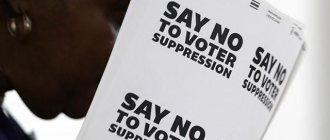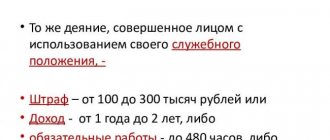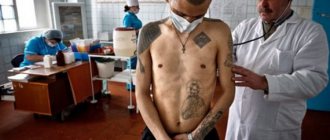According to Art. 31 of the Constitution, citizens are allowed to gather without weapons, peacefully hold rallies and demonstrations, meetings, pickets and processions. However, in connection with a number of events, this right was detailed in Federal Law No. 54. In particular, the Law “On Rallies” provides that regulations governing the conditions for organizing these events are adopted by the president, the government, as well as regional executive government bodies. The provisions of the Federal Law are mandatory for compliance by all entities on the territory of the Russian Federation. To ensure compliance with regulations, the Criminal Code establishes liability for unlawful obstruction of public events. Let's take a closer look at the features of its application.
Responsibility
Entities violating the Law “On Rallies”, as well as Art. 31 of the Constitution, the following are punishable:
- Monetary recovery in the amount of up to 300 thousand rubles. or equal to salary/other income for 2 years.
- Forced labor for up to 3 years.
- Imprisonment for the same period.
In addition to the last two sanctions, the court may impose a ban on engaging in a specific activity or holding a specific position for 3 years.
Are medical examination services subject to taxation?
Medical examinations of workers are carried out before entering certain types of work and to prevent diseases. For example, in organizations operating transport, drivers must undergo a medical examination before and after the trip (Article 20 of the Law “On Road Traffic Safety” dated December 10, 1995 No. 196-FZ).
Medical examination services are exempt from VAT. However, a medical organization or private practitioner must have a license (Resolution of the Government of the Russian Federation of April 16, 2012 No. 291).
The enterprise can organize a medical office or health center, where medical staff from clinics or medical workers under contracts will work.
The contract for the provision of medical services must specify the actions of the person conducting the medical examination and the grounds for removing drivers from work. The medical examination data is recorded in a special journal. The waybill for a driver admitted to the flight is stamped: “Admitted.” This is proof for the traffic police that the medical examination was carried out.
Compliance with these requirements can be verified by Rostransnadzor or a labor inspectorate. Failure to comply will lead to fines for the manager and the company itself (Article 11.32, Article 12.31.1, Article 12.32 of the Administrative Code).
Explanations
The previous Criminal Code (1960) contained an analogue of Art. 149 of the Criminal Code of the Russian Federation. In accordance with it, punishment was imposed not only for unlawful obstruction of mass events, including by officials. Responsibility was also established for the same acts, accompanied by the use of violence, destruction of property, resulting in grave consequences for the victims. Art. 149 of the Criminal Code of the Russian Federation does not contain part of these circumstances. Meanwhile, the main elements of the crime have been preserved as normal. Moreover, according to experts, the current version of the article directs citizens towards the peaceful holding of mass events.
Judicial practice under Article 149 of the Criminal Code of the Russian Federation
The appeal ruling of the Judicial Collegium for Criminal Cases of the Supreme Court of the Russian Federation dated October 10, 2017 N 35-APU17-12
denied compensation for moral damage in connection with his acquittal on charges of committing a crime under Art. and part 2 of Art. 149 of the Criminal Code of the RSFSR. After hearing the report of judge A.N. Klimov, the explanation of the convicted V.A. Vasiliev. in videoconference mode, who supported the arguments of his appeal, the opinion of prosecutor V.Yu. Gurova, who believed that the decision should be left unchanged, the Judicial Collegium
Resolution of the Presidium of the Supreme Court of the Russian Federation dated June 20, 2018 N 64P18
Chernenko Konstantin Gennadievich, ... convicted: February 20, 1996 under Art. , part 2 art. 144, part 2 art. 144, part 1 art. 149, art. , Criminal Code of the RSFSR to 3 years of suspended imprisonment with a probationary period of 2 years; March 12, 1999 under Part 2 of Art. 108 of the Criminal Code of the RSFSR to 8 years in prison, on the basis of Art. Criminal Code of the RSFSR to 9 years in prison, on July 1, 2005, released on parole for 4 months 16 days, -
Appeal ruling of the Judicial Collegium for Criminal Cases of the Supreme Court of the Russian Federation dated December 24, 2019 N 5-APU19-86
to the resolution of the Deputy Prosecutor General of the Russian Federation dated July 24, 2022, which satisfied the request of the General Prosecutor's Office of the Republic of Belarus to extradite I.V. Demyanchuk. to bring to criminal liability for committing crimes under Part 1 of Art. 149, part 4 art. 209 of the Criminal Code of the Republic of Belarus, was left without satisfaction.
Appeal ruling of the Appeal Board of the Supreme Court of the Russian Federation dated 07/07/2020 N APL20-159
From the case materials it appears that by the verdict of the Tomsk Regional Court of October 14, 1991 Sukhinin V.A. Convicted for a combination of crimes provided for in paragraphs “d”, “h” of Article 102, Part 1 of Article 144, Part 2 of Article 149 of the Criminal Code of the RSFSR, to an exceptional measure of punishment - the death penalty. By the ruling of the Judicial Collegium for Criminal Cases of the Supreme Court of the RSFSR dated February 28, 1992, this sentence was left unchanged. March 10, 1992 and August 20, 1992 Sukhinin V.A. filed written petitions for pardon. Having considered these petitions, the President of the Russian Federation, guided by the principle of humanity, issued a Decree on his pardon, which Sukhinin V.A. the death penalty was replaced by life imprisonment.
Appeal ruling of the Judicial Collegium for Criminal Cases of the Supreme Court of the Russian Federation dated April 18, 2017 N 32-APU17-7sp
Utkin A.P. ... previously tried on May 5, 1995 by the Judicial Collegium for Criminal Cases of the Saratov Regional Court (taking into account the changes made by the Determination of the Judicial Collegium for Criminal Cases of the Supreme Court of the Russian Federation on July 20, 1995) under Art. 102 paragraphs “a”, “e”, “n”, part 1 of Art. 149, paragraphs “a”, “c”, part 2 of Art. 146 of the Criminal Code of the RSFSR to 15 years in prison with confiscation of property, released on May 12, 2009 based on the decision of the Pugachevsky District Court of the Saratov Region dated April 29, 2009, on parole for 4 months 14 days,
Specifics of the crime
Unlawful obstruction of pickets, marches, meetings and other public events, as well as participation in them, can be manifested by action or inaction. For example, an official authorized to make decisions about their organization may pass an act that unlawfully prohibits citizens from exercising their constitutional right. Action can manifest itself in creating real barriers to people's paths. These can be both material objects and barriers from law enforcement officers. Inaction is manifested, for example, in the failure to provide meeting space.
Mandatory signs
In Art. 149 of the Criminal Code of the Russian Federation indicates two types of subjects of crime. It may be an official who took advantage of his official status. A citizen who does not hold any responsible positions also acts as a subject. In this case, he may be held accountable if his actions were accompanied by violence or the threat of its use. Thus, in a crime there is a general and a special subject. The last one is a sane citizen who has reached the age of sixteen. The essence of violence or the threat of its use is the same as when obstructing the exercise of electoral rights or the functioning of election commissions.
Commentary to Art. 149 of the Criminal Code of the Russian Federation
According to the Constitution of the Russian Federation (Article 31), citizens of the Russian Federation have the right to assemble peacefully, without weapons, to hold meetings, rallies and demonstrations, processions and picketing. Based on this, the main object of the crime is relations, if possible, in the established order of holding or participating in a meeting, meeting, demonstration, procession, picketing.
Depending on the method of preventing the exercise of this right, an additional object is possible, which can be: the health of a person, the interests of state power, public service, service in local government bodies.
The objective side of the crime is expressed in the performance of any of the alternative actions:
1) illegal obstruction of a meeting, rally, demonstration, procession, picketing (for example, illegal prohibition of their holding);
2) unlawful obstruction of participation in them (the person was not allowed to attend the meeting or was removed from it);
3) coercion to participate in them.
The method of committing a crime is included as a mandatory feature of the objective side - the use of violence or the threat of its use, the use of official position.
Violence is understood as physical influence on the victim, expressed in the suppression and elimination of his resistance, striking, beating, and deliberately causing minor harm to health.
The threat of violence is understood as a mental impact on the victim, expressed in a demonstration of readiness to inflict blows, beatings, or intentionally cause harm to health.
Infliction of serious or aggravated harm to the health of the victim under aggravating circumstances requires additional qualification under the relevant articles of the Special Part of the Criminal Code of the Russian Federation. The threat of murder or infliction of grievous bodily harm (Part 1 of Article 119 of the Criminal Code of the Russian Federation), beatings (Article 116 of the Criminal Code of the Russian Federation) and causing minor harm to health (Article 115 of the Criminal Code of the Russian Federation) are covered by the crime under consideration and do not require additional qualifications.
A meeting is the joint presence of citizens in a specially designated or adapted place for a collective discussion of any socially significant issues.
A rally is a mass presence of citizens in a certain place for the public expression of public opinion on current issues of a primarily socio-political nature.
A demonstration is an organized public expression of public sentiment by a group of citizens using posters, banners and other means of visual propaganda while moving.
A procession is a mass passage of citizens along a predetermined route in order to attract attention to any problems.
Picketing is a form of public expression of opinions carried out without movement and the use of sound-amplifying technical means by placing one or more citizens at the picketed object using posters, banners and other means of visual propaganda.
———————————
See: art. 2 of the Federal Law of June 19, 2004 N 54-FZ “On meetings, rallies, demonstrations, processions and picketing” // SZ RF. 2004. N 25. Art. 2485.
Obstruction of an assembly, rally, demonstration, procession, picketing will be illegal if it is expressed in their unreasonable ban contrary to the law or under a plausible pretext, the installation of barriers or the deployment of law enforcement forces to prevent people from accessing the site of a permitted, legal action, as well as in dispersing an already started meeting, rally or procession.
Physical or mental influence on a person, as a result of which he is forced to take part or refuse to participate in the event, for example, the threat of dismissal from work, transfer to a lower-paid position, assault, etc. .P.
The corpus delicti is formal. The crime is completed from the moment of commission of any of the acts that form the objective side of the crime. A crime consists of actions that impede only the legal conduct of these actions or participation in them. The conditions and procedure for holding actions are established by Federal Law No. 54-FZ of June 19, 2004 “On meetings, rallies, demonstrations, processions and pickets.”
———————————
NW RF. 2004. N 25. Art. 2485.
The subjective side of the crime is characterized by guilt in the form of direct intent. The person is aware that he is unlawfully preventing an assembly, rally, demonstration, procession, picketing or participation in them or forcing participation in them, commits this act using his official position, uses violence or the threat of violence, and wishes to carry out such actions.
Depending on the circumstances of the crime, the subject of the crime can be either a general subject - a sane person who has reached the age of sixteen years, or a special one - an official or a person performing illegal actions by virtue of his official position.


